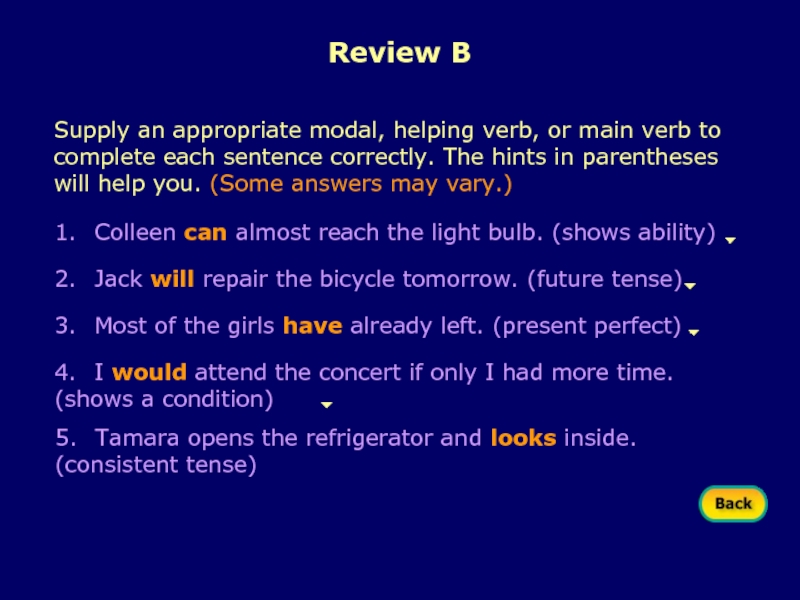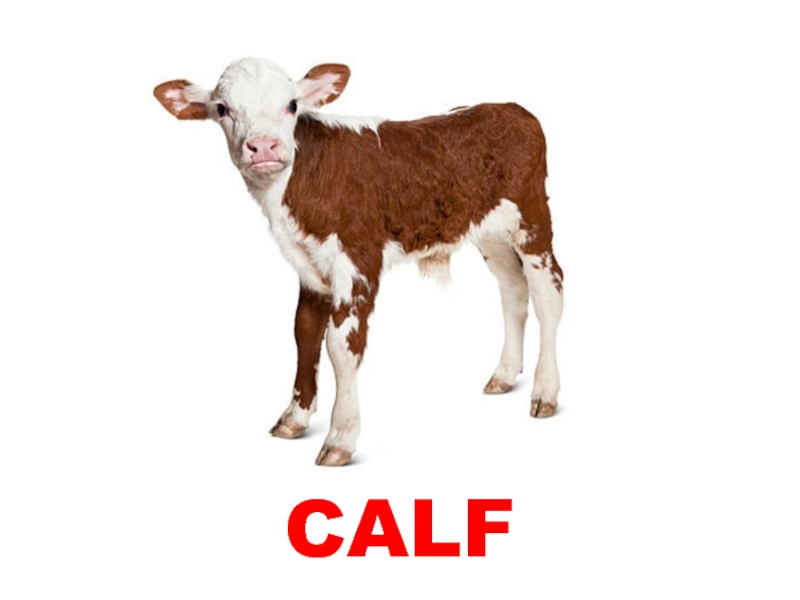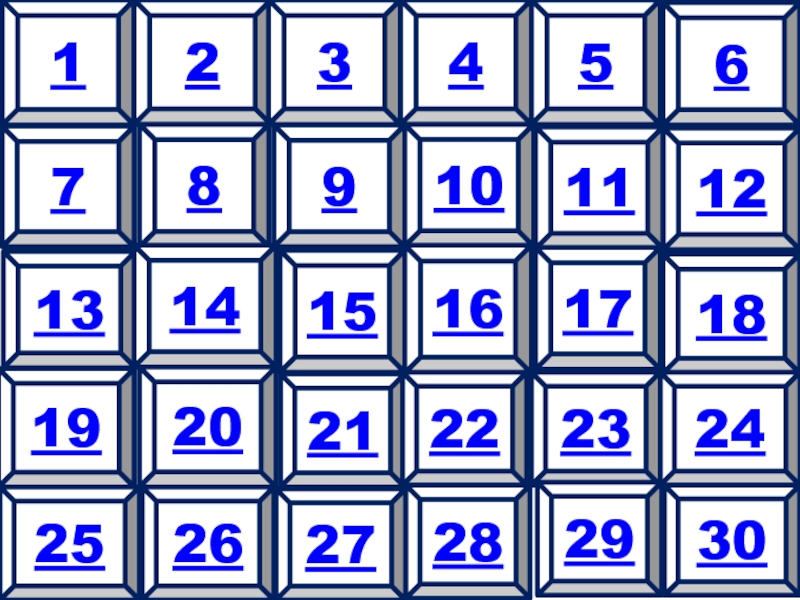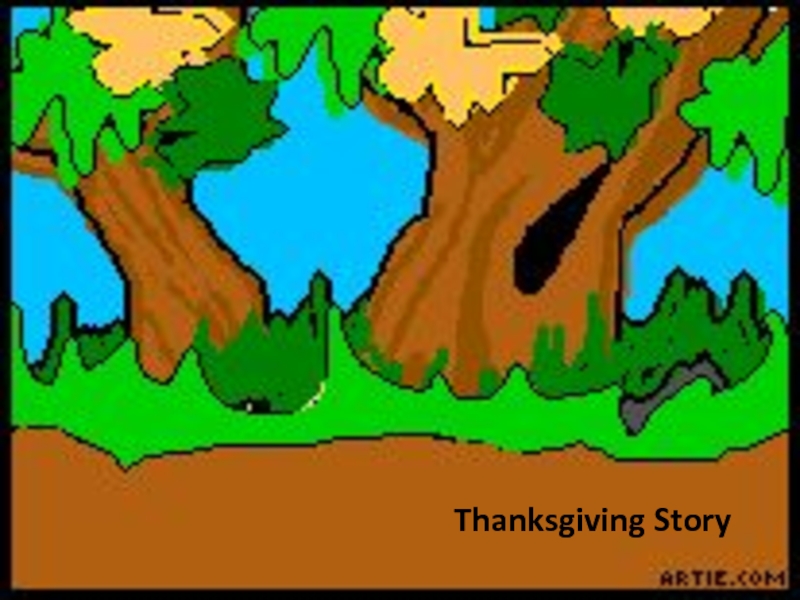- Главная
- Разное
- Дизайн
- Бизнес и предпринимательство
- Аналитика
- Образование
- Развлечения
- Красота и здоровье
- Финансы
- Государство
- Путешествия
- Спорт
- Недвижимость
- Армия
- Графика
- Культурология
- Еда и кулинария
- Лингвистика
- Английский язык
- Астрономия
- Алгебра
- Биология
- География
- Детские презентации
- Информатика
- История
- Литература
- Маркетинг
- Математика
- Медицина
- Менеджмент
- Музыка
- МХК
- Немецкий язык
- ОБЖ
- Обществознание
- Окружающий мир
- Педагогика
- Русский язык
- Технология
- Физика
- Философия
- Химия
- Шаблоны, картинки для презентаций
- Экология
- Экономика
- Юриспруденция
Understanding verb tense презентация
Содержание
- 1. Understanding verb tense
- 2. What are the verb tenses? Verbs do
- 3. Gwen plays guitar in a jazz
- 4. The tenses of verbs are formed from
- 5. Each tense has a progressive form, which
- 6. What are the verb tenses? Present and
- 7. What are the verb tenses? Present and
- 8. What are the verb tenses? Present and
- 9. What are the verb tenses? A
- 10. What are the verb tenses? Present and
- 11. What are the verb tenses? Past and
- 12. What are the verb tenses? Past and
- 13. What are the verb tenses? Future and
- 14. What are the verb tenses? Grammar
- 15. What are the verb tenses? Future and
- 16. 1. Lia will begin the yard work later.
- 17. What are the verb tenses? 1. Lia
- 18. What are the verb tenses? Identify
- 19. What are the verb tenses? Identify
- 20. [End of Section] Change the tense
- 21. Change the tense of the verb
- 22. Consistency of tense Do not change needlessly
- 23. Consistency of tense For events that occur
- 24. Consistency of tense For events that occur
- 25. 1. Kira caught the ball and throws it
- 26. Consistency of tense Possible Answer 1. Kira
- 27. Consistency of tense The action of
- 28. Consistency of tense Possible Answer The
- 29. Consistency of tense [End of Section]
- 30. Consistency of tense Possible
- 31. Modals A modal is a helping verb
- 32. Modals The modal can or could is
- 33. Modals The modal may is used to
- 34. Might/May Grammar Gal Says... Often, the
- 35. Modals The modal must is used most
- 36. Modals The modal ought is used to
- 37. Modals The modal will or shall is
- 38. Will/Shall Grammar Gal Says... While
- 39. Modals The modal should is used to
- 40. Modals The modal would is used to
- 41. Modals Would can also be used to
- 42. Modals Would is sometimes used to express
- 43. 1. The weather report said it may snow.
- 44. Identify the modal in each of the
- 45. Identify the modal in each of the
- 46. Identify the modal in each of the
- 47. Modals [End of Section] Supply
- 48. Modals Possible Answers Supply
- 49. Review A Change the tense of each
- 50. Review A Change the tense of
- 51. Review B [End of Section] 1. Colleen _____
- 52. Review B Supply an appropriate modal,
- 53. The End
Слайд 1Understanding verb tense
What are the verb tenses?
Present and present perfect
Past
Future and future perfect
Consistency of tense
Modals
Review A
Review B
Слайд 2What are the verb tenses?
Verbs do a lot of work in
flies
flew
will fly
Слайд 3
Gwen plays guitar in a jazz band.
The tense of a verb
Past
Future
Present
Present Perfect
She has played in the band for three years.
Future
Future Perfect
Perfect tenses indicate that something happened or existed before a specific point in time.
Gwen will play in a concert tomorrow.
She will have played in ten concerts by April.
Past
Gwen played last year as well.
Past Perfect
She had played violin before then.
Present
What are the verb tenses?
Слайд 4The tenses of verbs are formed from the four principal parts
Present Participle
Base Form
Past
Past Participle
smile
choose
[is] smil
[is] choos
ing
smile
d
cho
se
[have] smile
d
[have] cho
sen
ing
What are the verb tenses?
Слайд 5Each tense has a progressive form, which is used to express
What are the verb tenses?
Present progressive
am, are, is talking
Past progressive
was, were talking
Future progressive
will (shall) be talking
Present perfect progressive
has, have been talking
Past perfect progressive
had been talking
Future perfect progressive
will (shall) have been talking
Слайд 6What are the verb tenses?
Present and present perfect
The present tense expresses
Today we honor our veterans.
Polly is marching in the parade.
(Progressive form)
Слайд 7What are the verb tenses?
Present and present perfect
The present tense is
Слайд 8What are the verb tenses?
Present and present perfect
The present perfect tense
is
expresses an action or a state of being that occurred at an indefinite time in the past
Mike has been in several parades.
He has played the drum in all of them.
Слайд 9
What are the verb tenses?
A helping verb (also called an auxiliary
I was reading a novel by Sandra Cisneros.
I was reading a novel by Sandra Cisneros.
I was reading a book by Sandra Cisneros.
Helping verb
Main verb
Some commonly used helping verbs include is, are, has, had, did, does, can, could, should, and will.
Слайд 10What are the verb tenses?
Present and present perfect
The present perfect tense
Yoko has been taking flute lessons for six years.
Mr. Lee has taught music at our school since 2004.
(Progressive form)
Слайд 11What are the verb tenses?
Past and past perfect
The past tense expresses
They were swinging for a long time.
The two friends shared the large swing.
(Progressive form)
Слайд 12What are the verb tenses?
Past and past perfect
The past perfect tense
is
expresses an action or a state of being that ended before another past action or state of being occurred
After Maria had gone home, Kim was bored.
She asked her dad about the time that he had been a lifeguard at the beach.
Слайд 13What are the verb tenses?
Future and future perfect
The future tense
is usually
expresses an action or a state of being that will occur
My family will ride the train to Chicago.
We will be arriving at five o’clock.
(Progressive form)
Слайд 14What are the verb tenses?
Grammar Gal Says...
We can also express
We are going to make our own costumes.
They are about to begin the awards ceremony.
I have a test tomorrow.
Слайд 15What are the verb tenses?
Future and future perfect
The future perfect tense
is
expresses an action or a state of being that will end before another future action or state of being
By the time you receive this letter, she will have returned home.
After this trip, he will have been to Chicago three times.
Слайд 161. Lia will begin the yard work later.
Lia will have begun the
Identify the tense of each verb in bold. Be prepared to explain the difference in meaning between the sentences in each pair.
What are the verb tenses?
2. Jamie lived there for three years.
Jamie has been living there for three years.
3. Some of the girls were practicing karate.
Some of the girls have practiced karate.
Слайд 17
What are the verb tenses?
1. Lia will begin the yard work later.
Lia
Identify the tense of each verb in bold. Be prepared to explain the difference in meaning between the sentences in each pair.
future tense
future perfect tense
Expresses an action (beginning the yard work) that will occur in the future (later).
Expresses an action (beginning the yard work) that will be complete before some future action takes place (lunch).
Слайд 18
What are the verb tenses?
Identify the tense of each verb in
past tense
present perfect progressive
The action (lived) occurred in the past and did not continue into the present.
The action (has been living) was occurring in the past and continues into the present.
2. Jamie lived there for three years.
Jamie has been living there for three years.
Слайд 19
What are the verb tenses?
Identify the tense of each verb in
past progressive
present perfect tense
The action (practicing) was occurring in the past and did not continue into the present.
The action (practiced) occurred in the past and continues into the present.
3. Some of the girls were practicing karate.
Some of the girls have practiced karate.
Слайд 20
[End of Section]
Change the tense of the verb in each sentence,
1. I do not miss the bus. (Change to future.)
2. Were they at the party? (Change to past perfect.)
3. By then, Keith had returned. (Change to future perfect.)
4. The team will practice for an hour with no break. (Change to future perfect progressive.)
5. My sister dances well. (Change to past.)
On Your Own
What are the verb tenses?
Слайд 21
Change the tense of the verb in each sentence, as indicated
1. I do not miss the bus. (Change to future.)
2. Were they at the party? (Change to past perfect.)
3. By then, Keith had returned. (Change to future perfect.)
4. The team will practice for an hour with no break. (Change to future perfect progressive.)
5. My sister dances well. (Change to past.)
Answers
What are the verb tenses?
1. I will not miss the bus.
2. Had they been at the party?
3. By then, Keith will have returned.
4. The team will have been practicing for an hour with no break.
5. My sister danced well.
Слайд 22Consistency of tense
Do not change needlessly from one tense to another.
To
Sara peeked over the fence and saw a cornfield.
Sara peeks over the fence and sees a cornfield.
past tense
past tense
present tense
present tense
Слайд 23Consistency of tense
For events that occur at different times, use verbs
The pitcher wished that he had practiced more before the game.
past tense
past perfect tense
The action of wishing happened after the action of practicing was complete.
Слайд 24Consistency of tense
For events that occur at different times, use verbs
Yesterday, Nina told us that her brother works
every week at the senior center.
past tense
The action of telling occurred at a specific time in the past. The action of working occurs now.
present tense
Слайд 251. Kira caught the ball and throws it to first base.
2. Lily lives
3. My cousin has broken his leg, so I helped him get around.
Change each sentence to make the verb tense consistent. Be prepared to explain your answers. Hint: One sentence is already correct (C).
Consistency of tense
Слайд 26
Consistency of tense
Possible Answer
1. Kira caught the ball and threw it to
The actions occur at the same time, so the verbs should both be in the same tense.
Change each sentence to make the verb tense consistent. Be prepared to explain your answers. Hint: One sentence is already correct (C).
Слайд 27
Consistency of tense
The action of living takes place now, but the
Change each sentence to make the verb tense consistent. Be prepared to explain your answers. Hint: One sentence is already correct (C).
2. Lily lives next door now but will soon move to another town.
C
Слайд 28
Consistency of tense
Possible Answer
The action of breaking the leg happened before
Change each sentence to make the verb tense consistent. Be prepared to explain your answers. Hint: One sentence is already correct (C).
3. My cousin had broken his leg, so I helped him get around.
Слайд 29Consistency of tense
[End of Section]
On Your Own
Proofread the paragraph for unnecessary
(1) I was in my room Saturday morning, planning to study for two hours. (2) To my surprise, Nancy Chang drops by. (3) She dashed into the house, runs up the stairs, and calls my name. (4) What she wanted was a fishing companion. (5) As I get my fishing gear together, I was so happy. (6) On our way to the lake, we notice some dark clouds. (7) We wished we checked the weather first.
Слайд 30
Consistency of tense
Possible Answers
(1) I was in my room Saturday morning,
dropped
ran
called
got
noticed
had
Слайд 31Modals
A modal is a helping verb that is joined with a
Слайд 32Modals
The modal can or could is used to express ability.
Tammy
The team could have made better shots.
Слайд 33Modals
The modal may is used to express permission or possibility.
Yes,
I might give some of my clothing to charity.
The modal might is used to express possibility.
Permission
My clothes closet may be too full.
Possibility
Слайд 34Might/May
Grammar Gal Says...
Often, the possibility expressed by might is less
The mechanic said the brakes may need work.
We might finish early, but I doubt it.
likely
less likely
Слайд 35Modals
The modal must is used most often to express a requirement.
We must conserve energy in our homes.
My brother must have left the lights on.
Requirement
Explanation
Слайд 36Modals
The modal ought is used to express an obligation or a
Reggie ought to study harder for math quizzes.
The next quiz ought to be more difficult than the last one.
Obligation
Likelihood
Слайд 37Modals
The modal will or shall is used to express future time.
After reviewing the entries, the panel will announce the winner.
I shall enter my painting in the contest.
Слайд 38Will/Shall
Grammar Gal Says...
While will and shall are both used to
Tim will look at your car tomorrow.
Tim shall look at your car tomorrow.
future time
intention
Слайд 39Modals
The modal should is used to express a recommendation, an obligation,
Terrell should leave soon to catch the bus.
All students should get to school on time.
Recommendation
Obligation
Possibility
Should you arrive late, please go to the office first.
Слайд 40Modals
The modal would is used to express the conditional form of
If the weather had been more pleasant, they would have gone on a picnic.
Mrs. Chang would be happy to prepare food if you bring the plates and forks.
Слайд 41Modals
Would can also be used to express future time in a
They promised us that they would bring the music.
past tense verb
Main clause
Subordinate clause
modal expresses future time
Слайд 42Modals
Would is sometimes used to express
Every day she would wake early
Would you like a nice, fresh salad?
an action that was repeated in the past
an invitation or offer
a polite request
Would you please bring me those books?
Слайд 431. The weather report said it may snow.
2. I tried, but I could
3. All participants must return their permission slips by Friday.
Identify the modal in each of the following sentences. Be prepared to tell what is expressed by the modal.
Modals
Слайд 44 Identify the modal in each of the following sentences.
Modals
1. The weather report
The modal may expresses possibility.
Слайд 45 Identify the modal in each of the following sentences.
Modals
The modal could
2. I tried, but I could not learn the program.
Слайд 46 Identify the modal in each of the following sentences.
Modals
The modal must
3. All participants must return their permission slips by Friday.
Слайд 47
Modals
[End of Section]
Supply an appropriate modal for each sentence.
1. Jen _____
2. _____ you please help Merrill with that large box?
3. You _____ probably guess what I am about to say.
4. If the train had been faster, we _____ have arrived sooner.
5. I’m not certain, but I think Dad _____ be cooking stew for dinner tonight.
On Your Own
Слайд 48
Modals
Possible Answers
Supply an appropriate modal for each sentence.
1. Jen must have cleaned
2. Would you please help Merrill with that large box?
3. You can probably guess what I am about to say.
5. I’m not certain, but I think Dad might be cooking stew for dinner tonight.
4. If the train had been faster, we would have arrived sooner.
Слайд 49Review A
Change the tense of each boldface verb to the tense
1. The otter swam to the edge of the pond. (present perfect)
2. Our class will read Shakespeare’s Macbeth. (future progressive)
3. The three sisters regularly meet for lunch. (past)
4. Each student chooses a lab partner. (past perfect)
5. Wasps were entering the house through the torn screen. (present)
Слайд 50Review A
Change the tense of each boldface verb to the tense
1. The otter has swum to the edge of the pond. (present perfect)
2. Our class will be reading Shakespeare’s Macbeth. (future progressive)
3. The three sisters regularly met for lunch. (past)
4. Each student has chosen a lab partner. (past perfect)
5. Wasps enter the house through the torn screen. (present)
Слайд 51Review B
[End of Section]
1. Colleen _____ almost reach the light bulb. (shows
2. Jack _____ repair the bicycle tomorrow. (future tense)
3. Most of the girls _____ already left. (present perfect)
4. I _____ attend the concert if only I had more time. (shows a condition)
5. Tamara opens the refrigerator and _____ inside. (consistent tense)
Supply an appropriate modal, helping verb, or main verb to complete each sentence correctly. The hints in parentheses will help you.
Слайд 52Review B
Supply an appropriate modal, helping verb, or main verb to
1. Colleen can almost reach the light bulb. (shows ability)
2. Jack will repair the bicycle tomorrow. (future tense)
3. Most of the girls have already left. (present perfect)
4. I would attend the concert if only I had more time. (shows a condition)
5. Tamara opens the refrigerator and looks inside. (consistent tense)

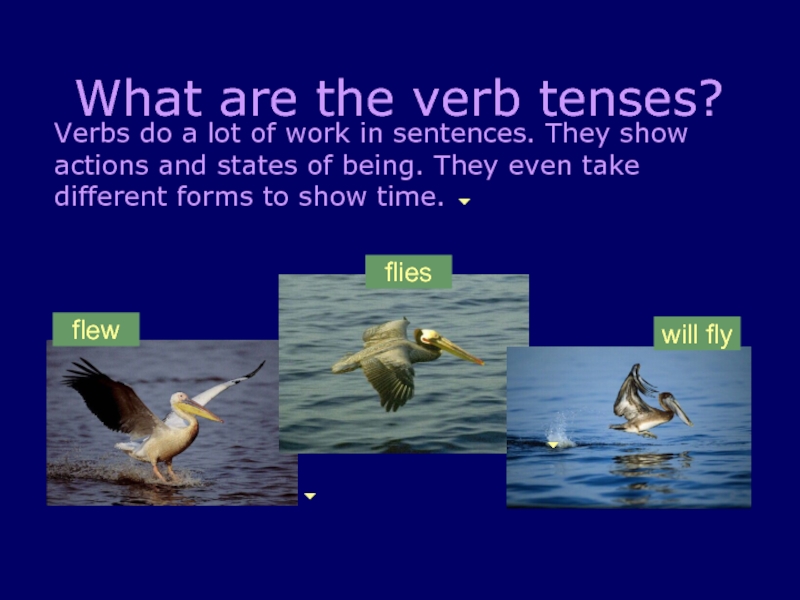
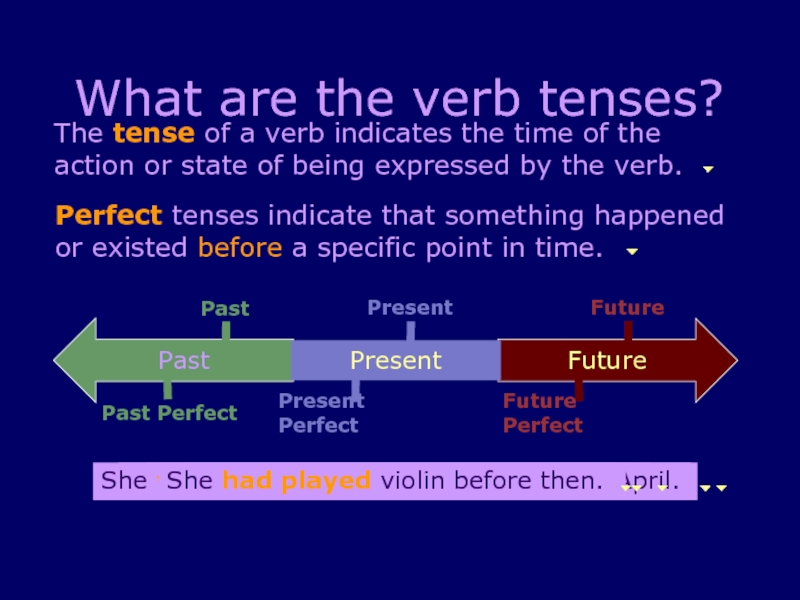
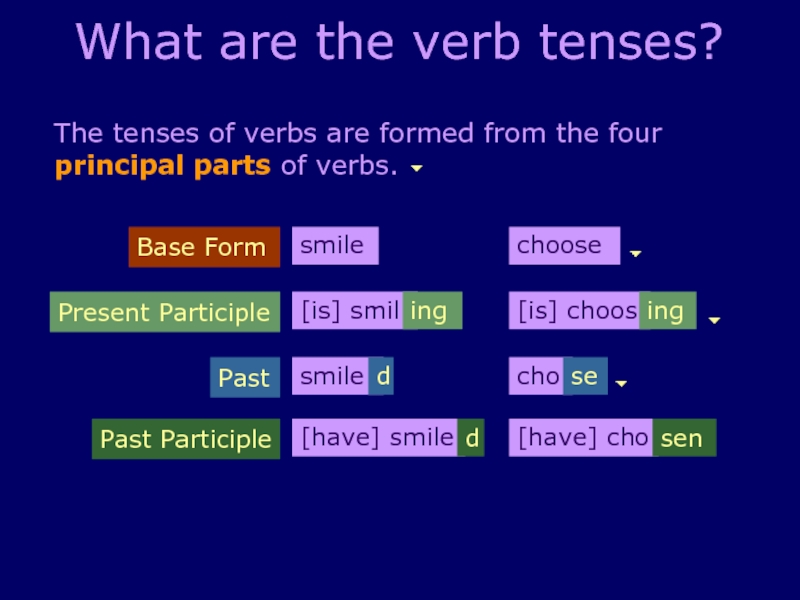
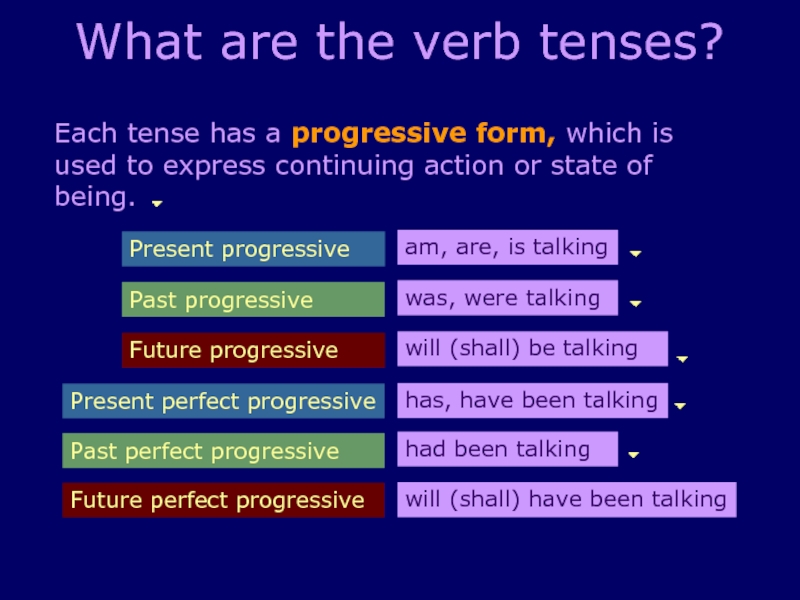
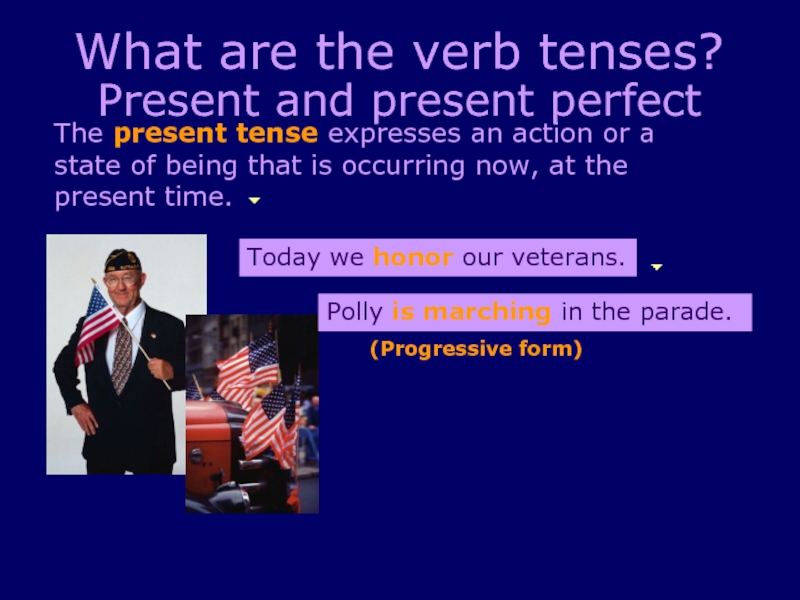
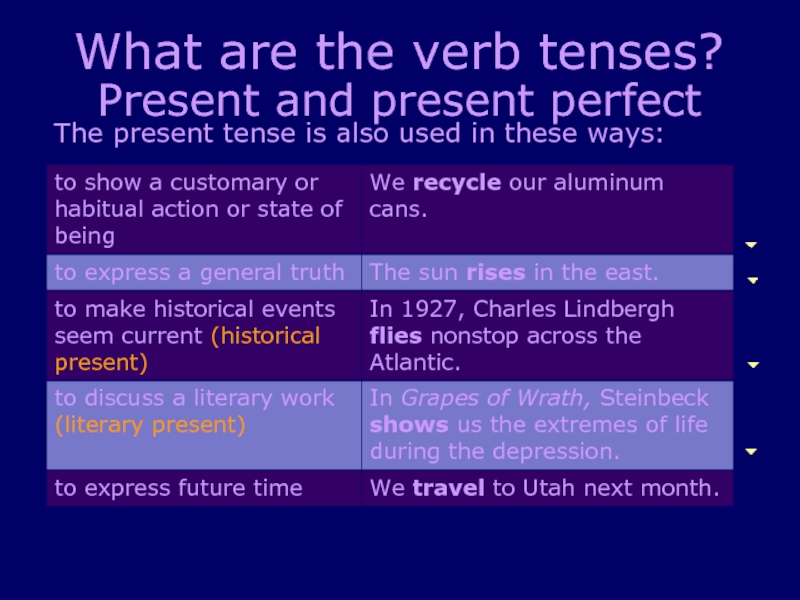
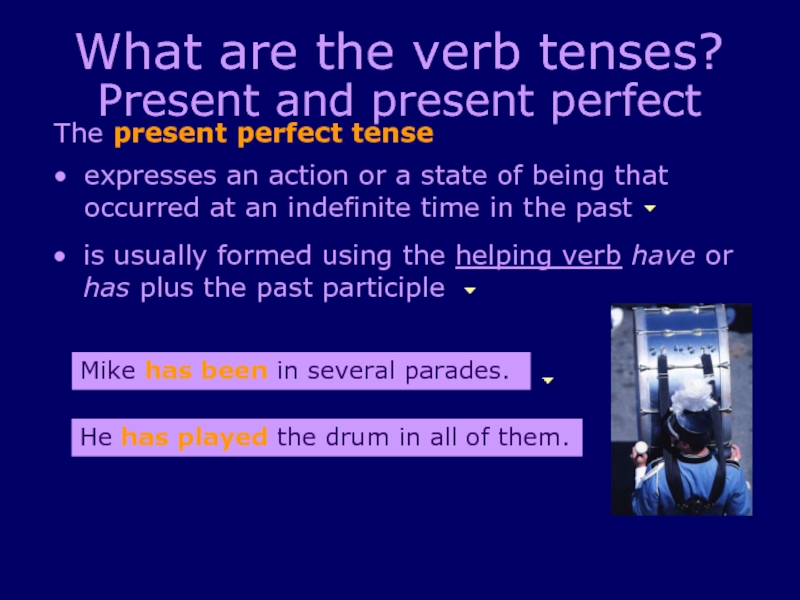
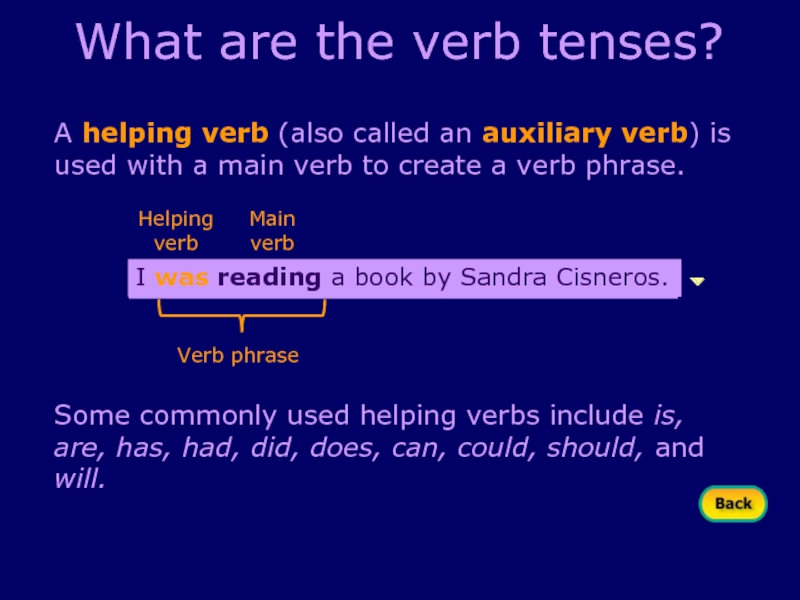
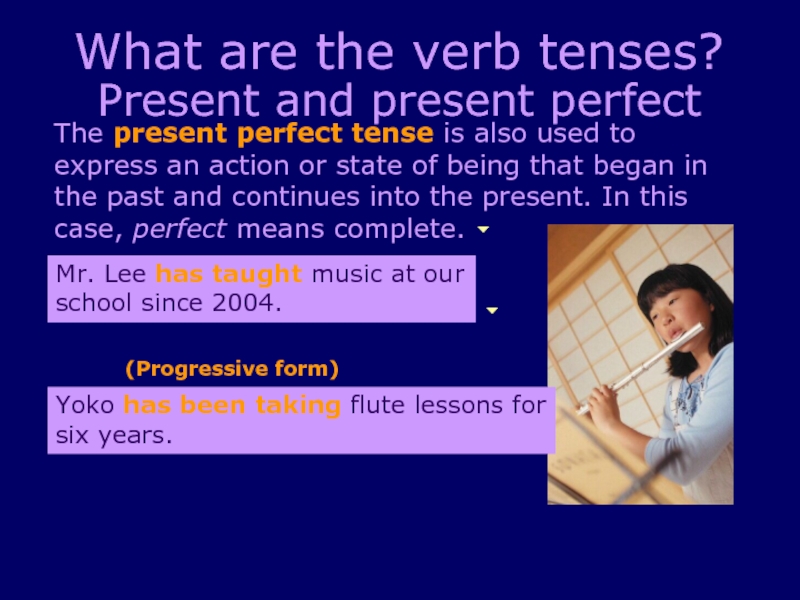
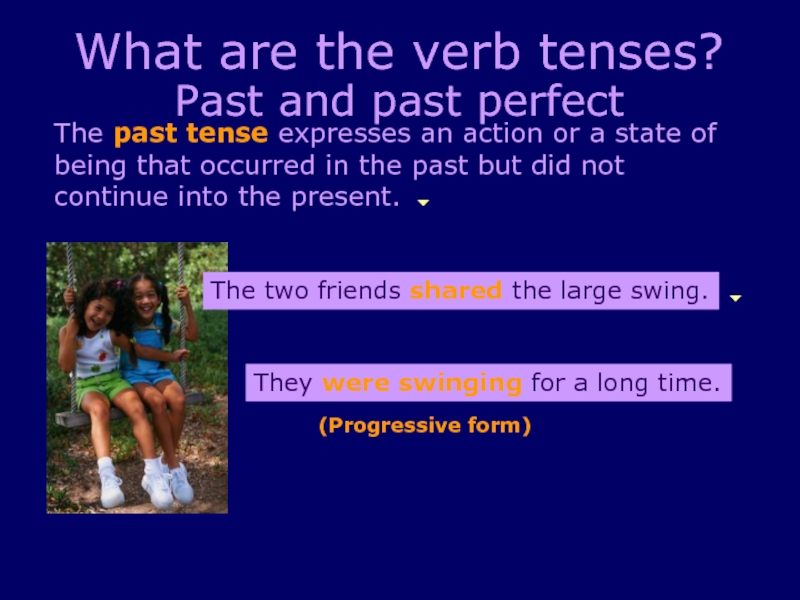
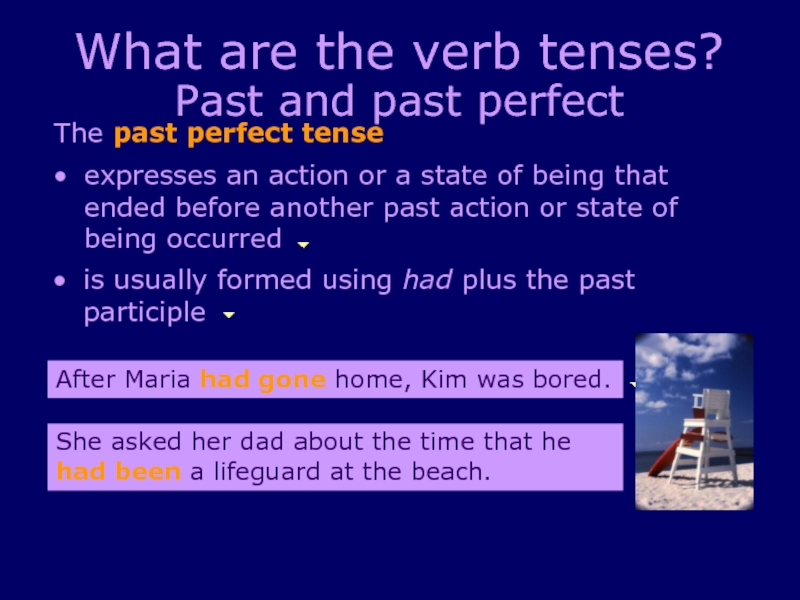
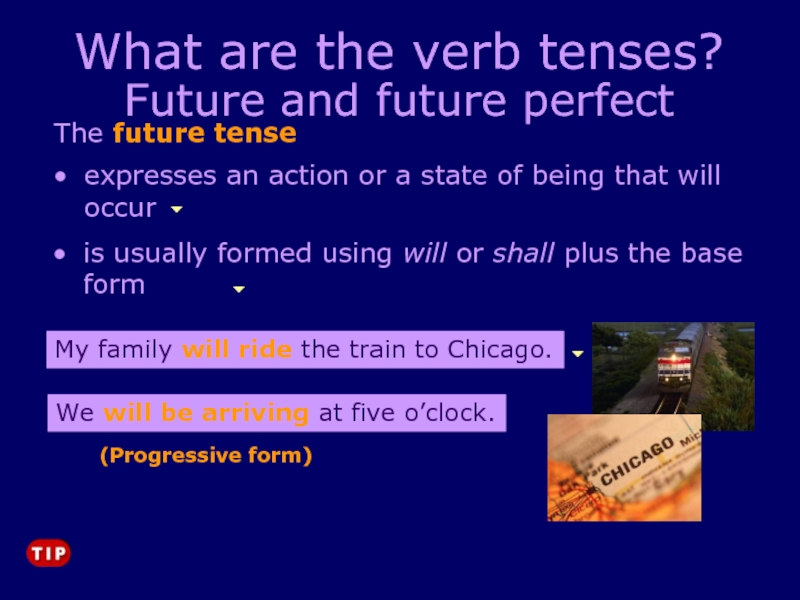
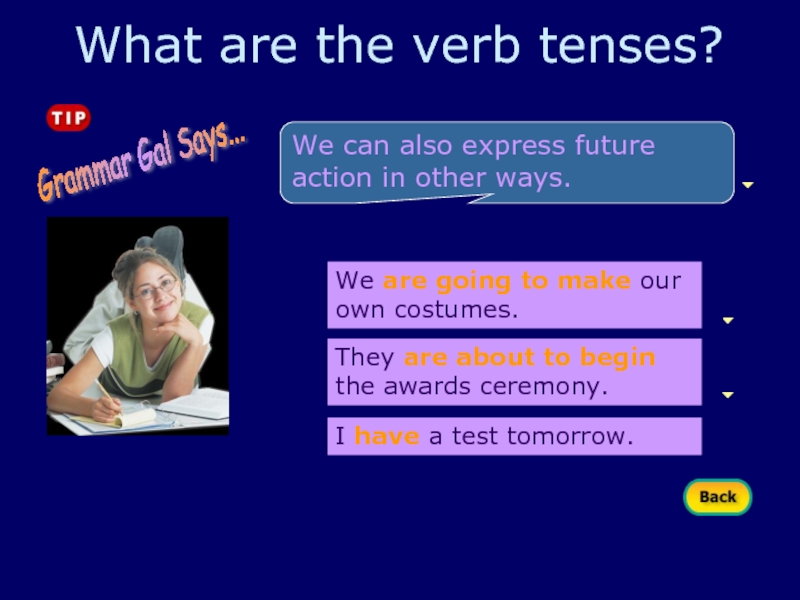

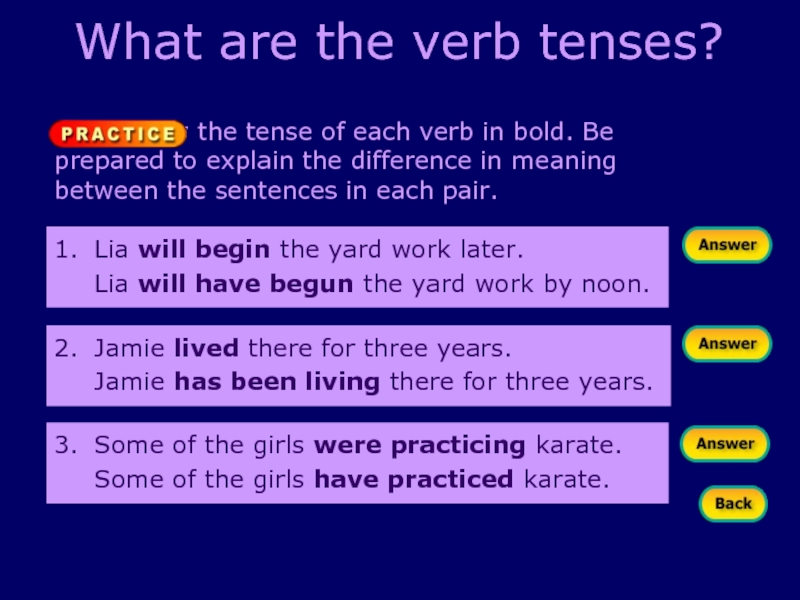

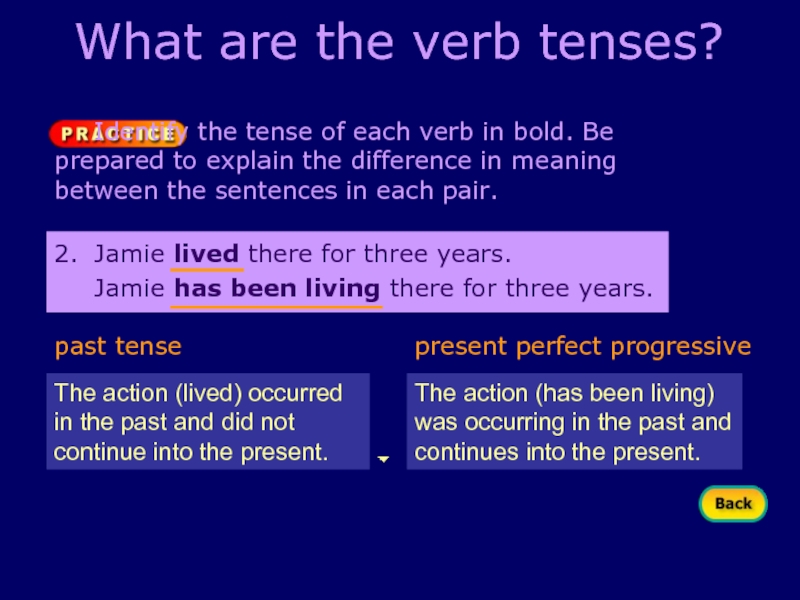
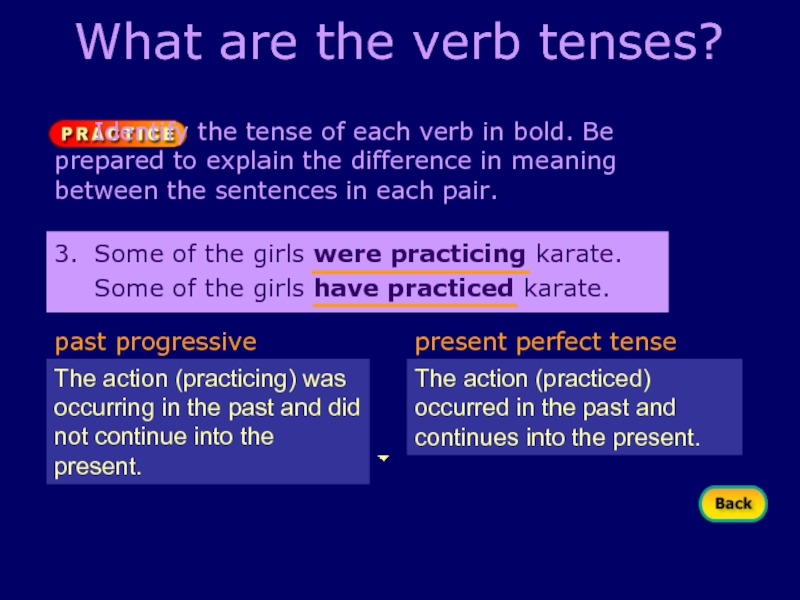
![[End of Section]Change the tense of the verb in each sentence, as indicated in parentheses.1.](/img/tmb/2/129855/b45c88963df46298d021b4ee6362ab83-800x.jpg)
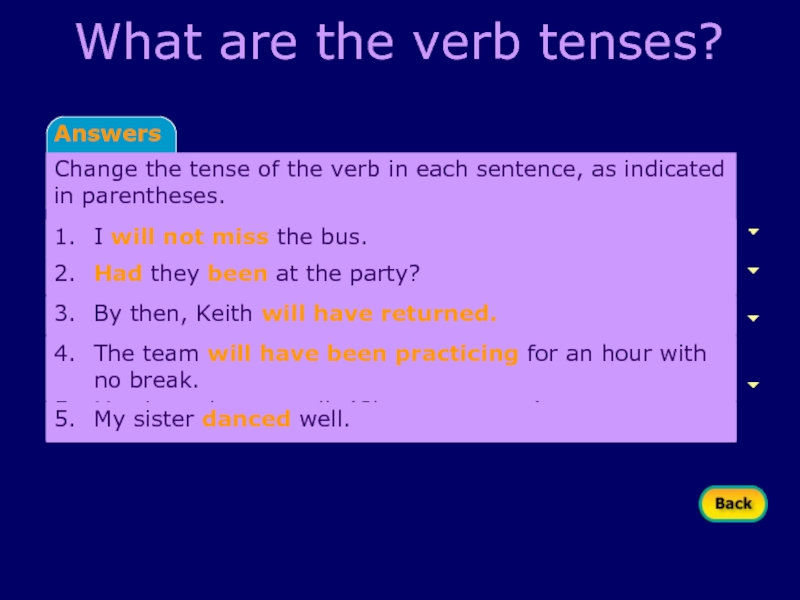
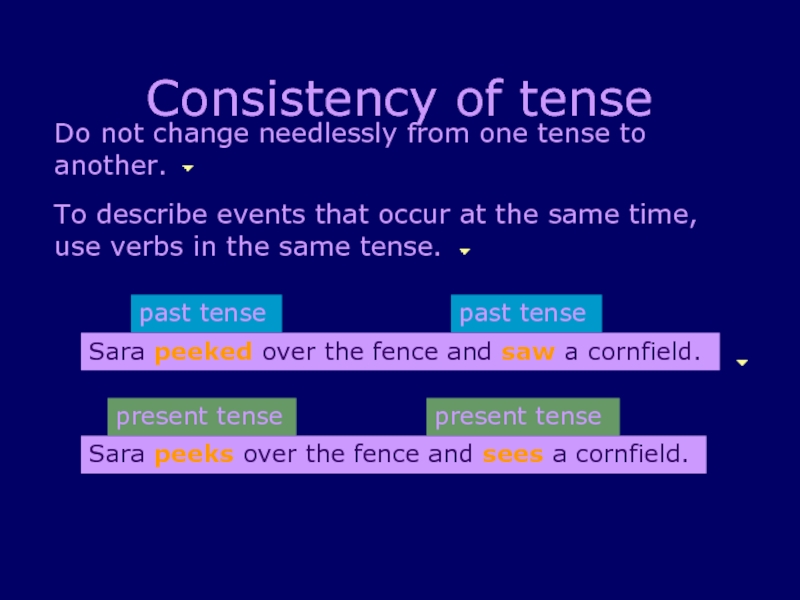
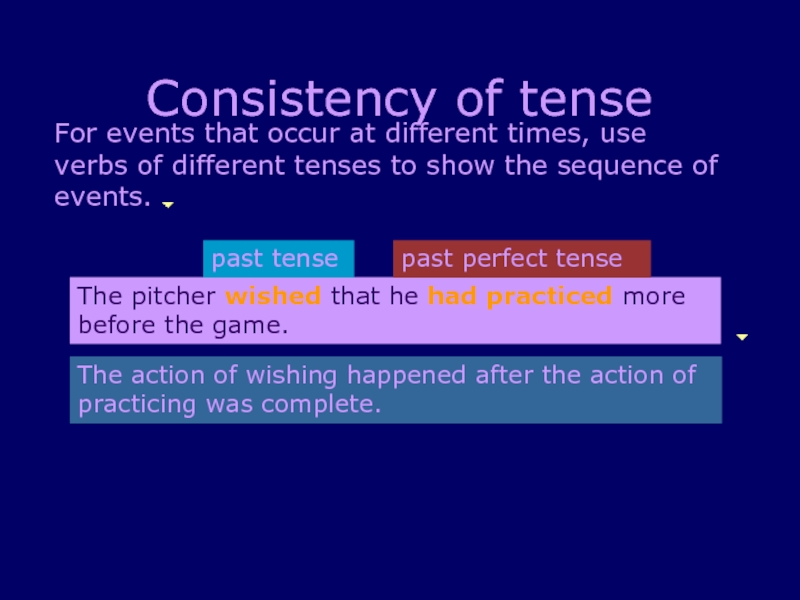
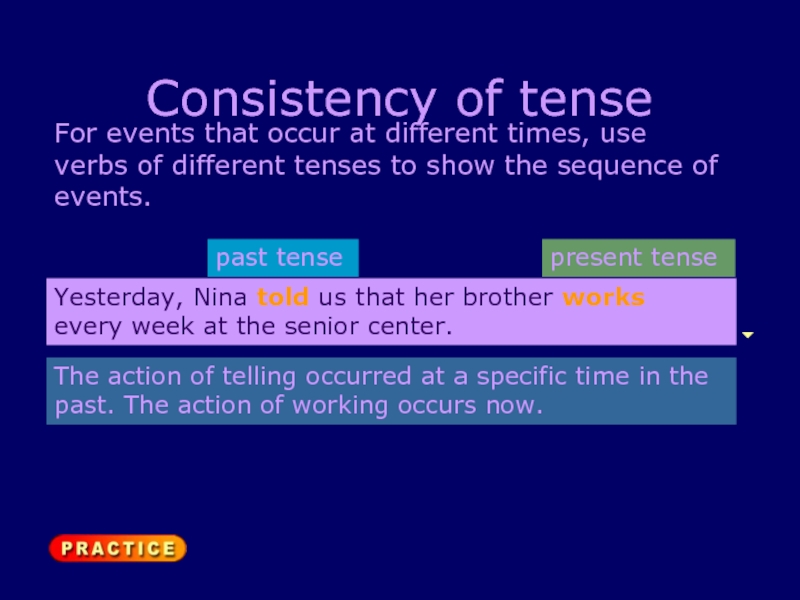
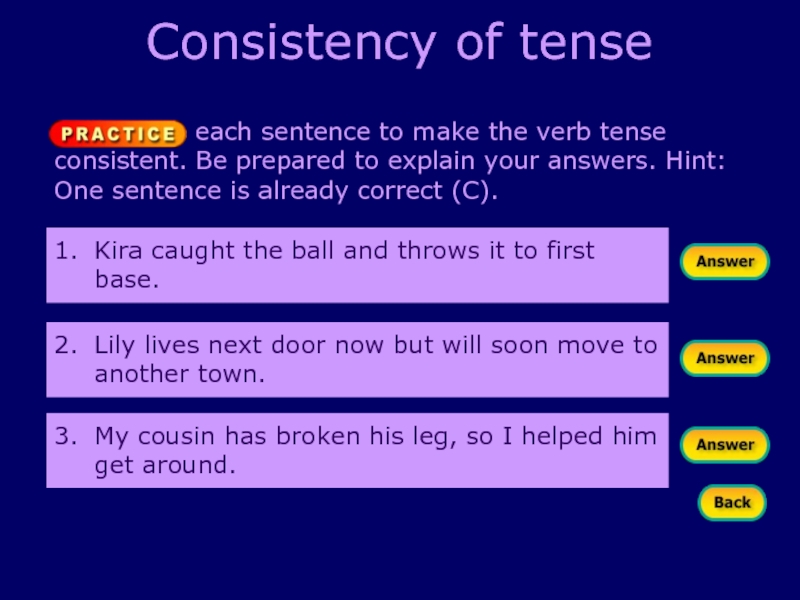
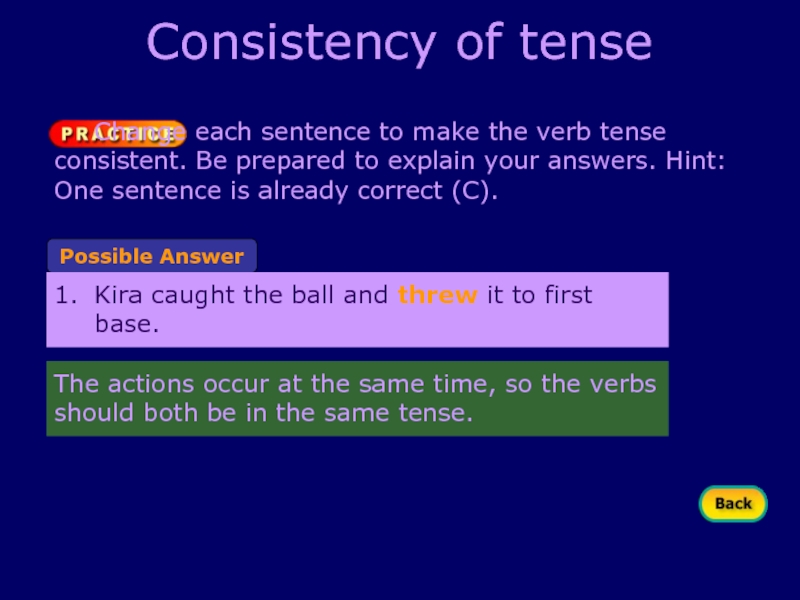
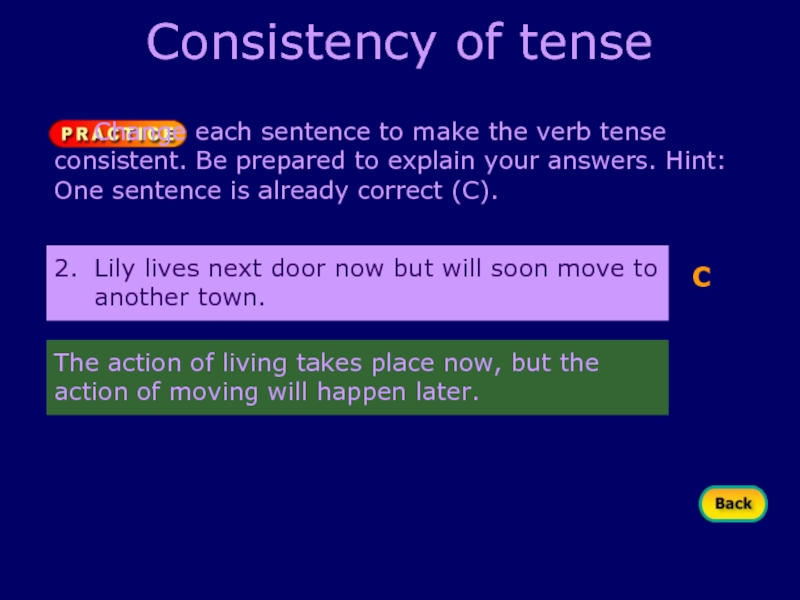
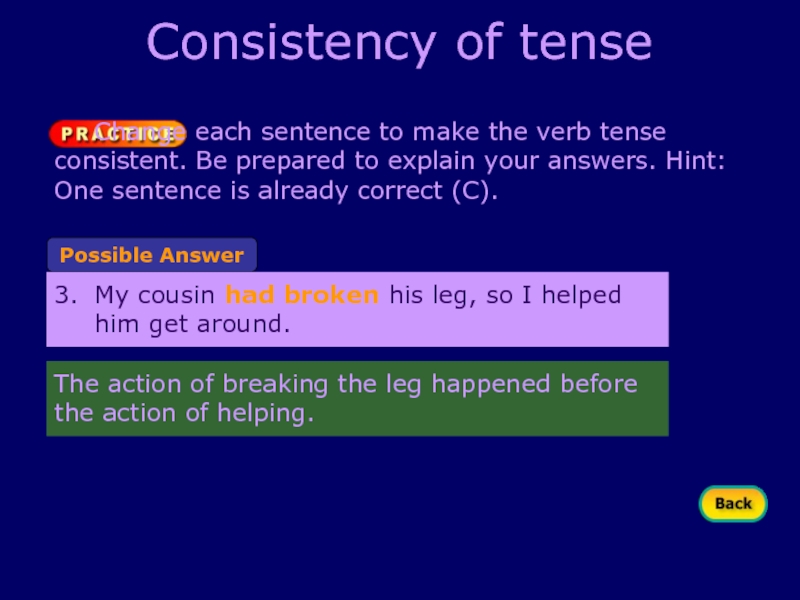
![Consistency of tense [End of Section]On Your OwnProofread the paragraph for unnecessary changes of verb](/img/tmb/2/129855/6ffc37bc9bc2a5f6f1b53e2f2f8dcb2c-800x.jpg)
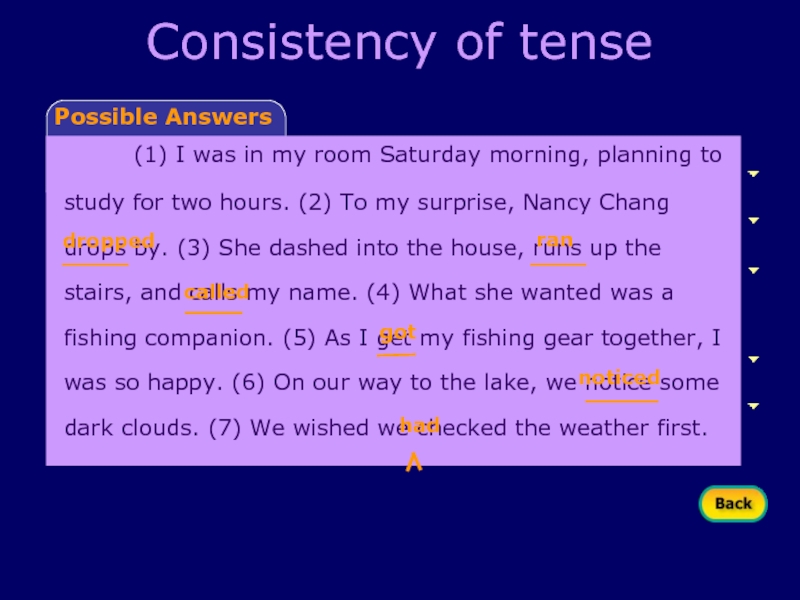
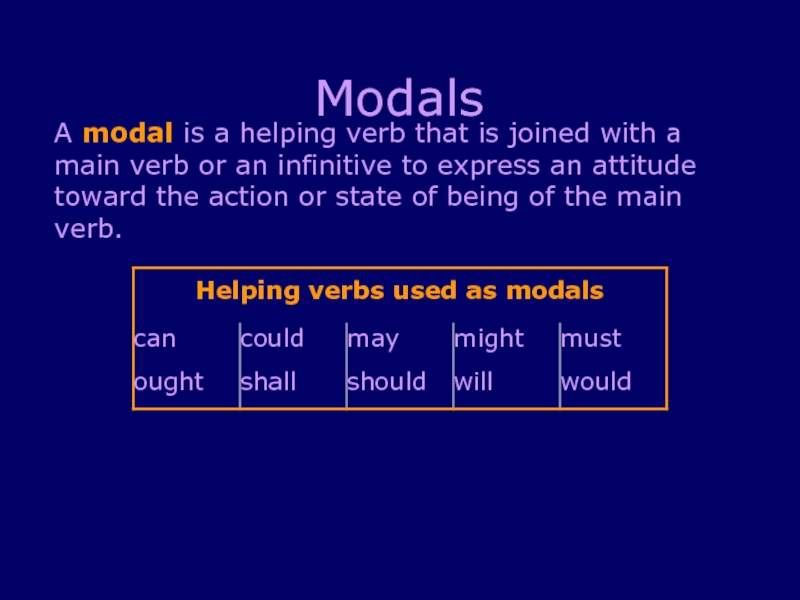
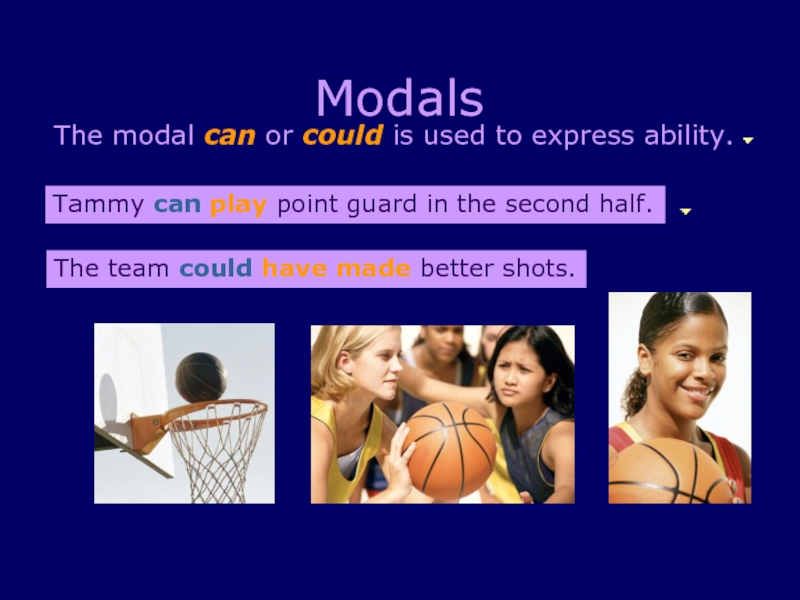

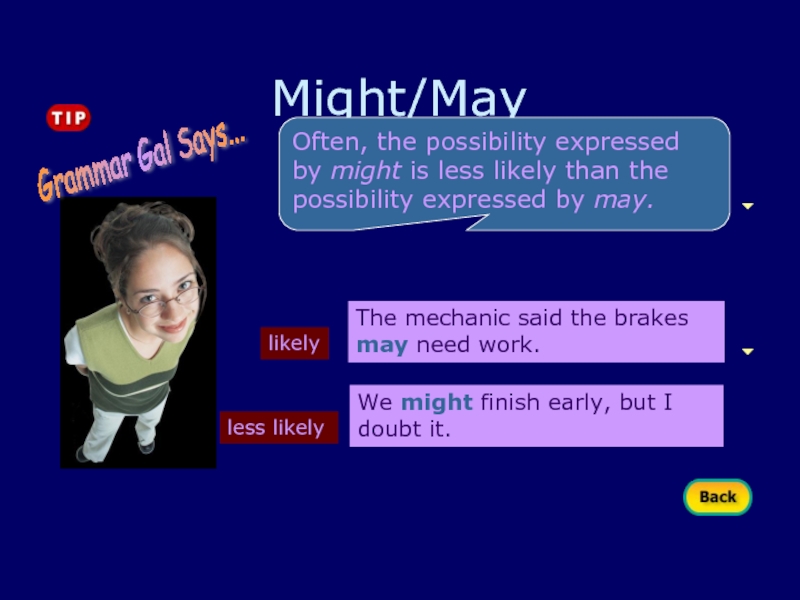
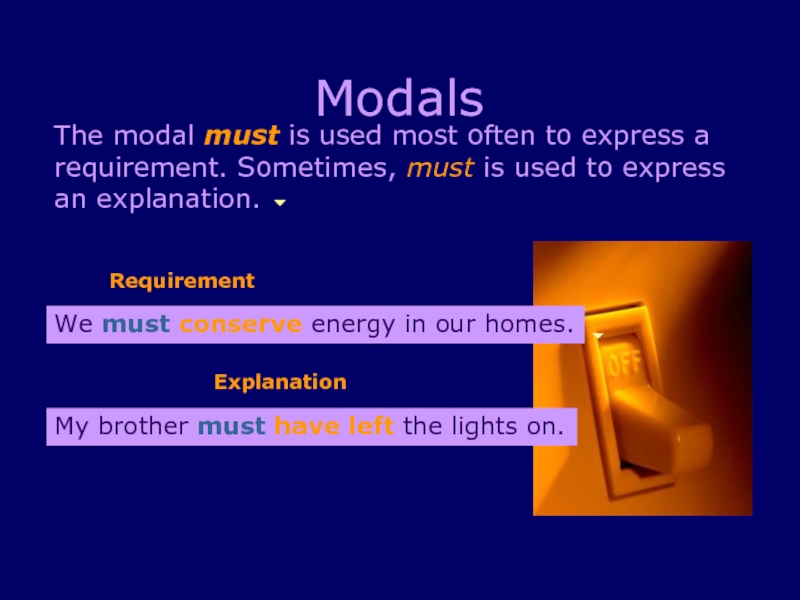
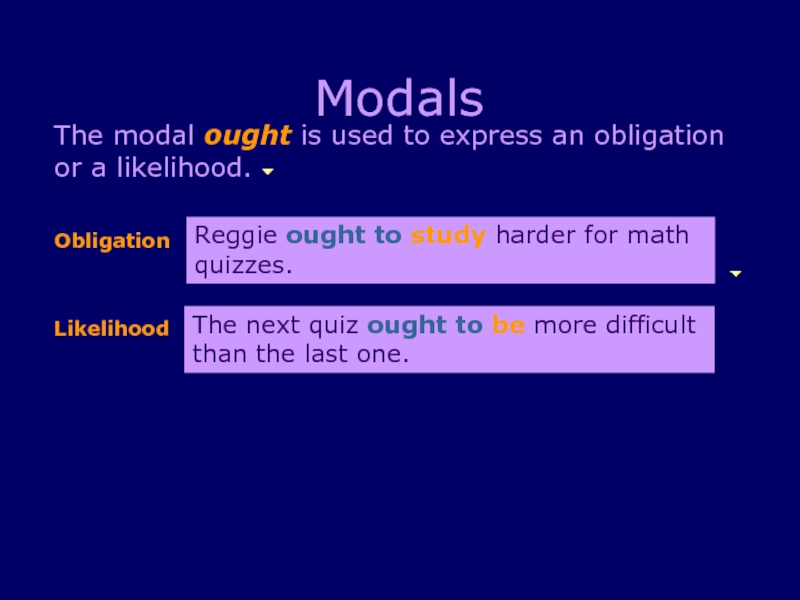
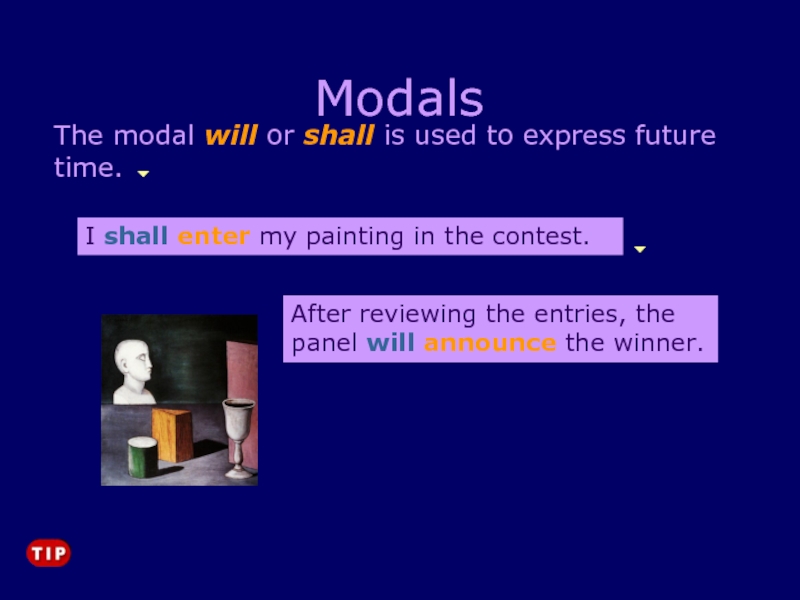
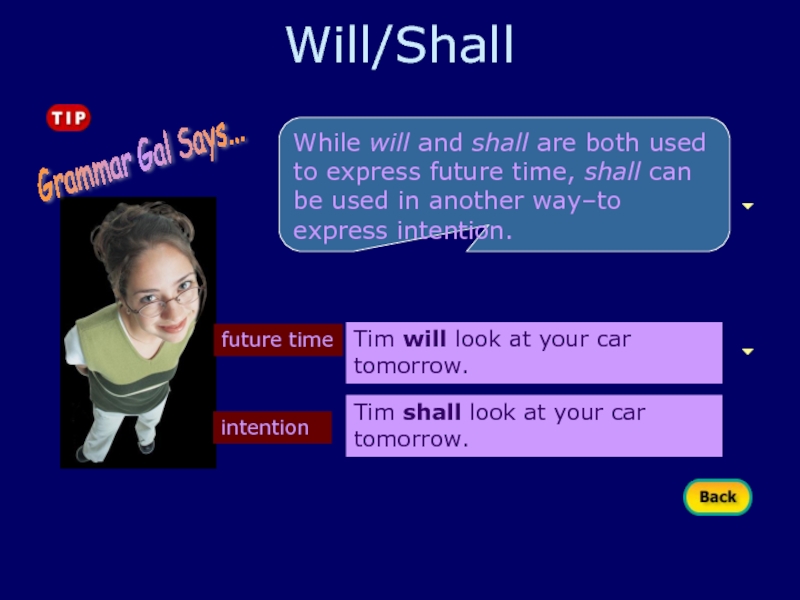
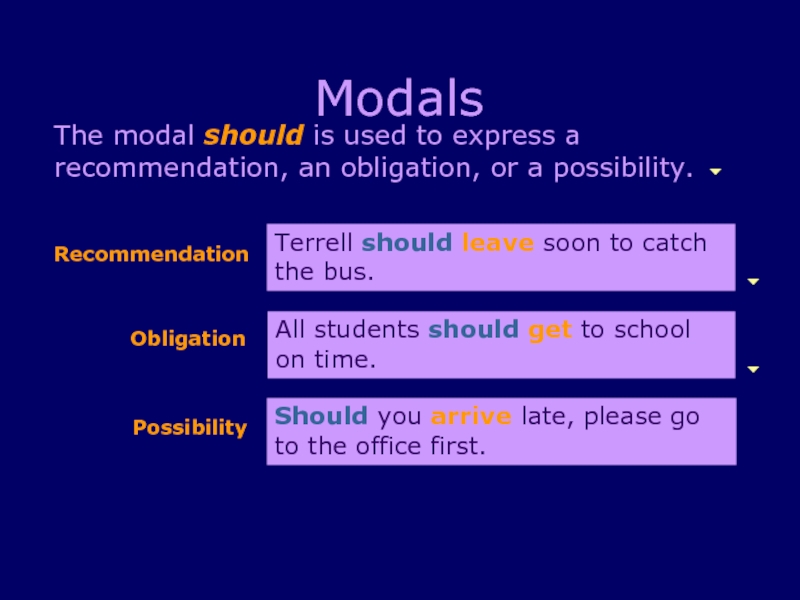
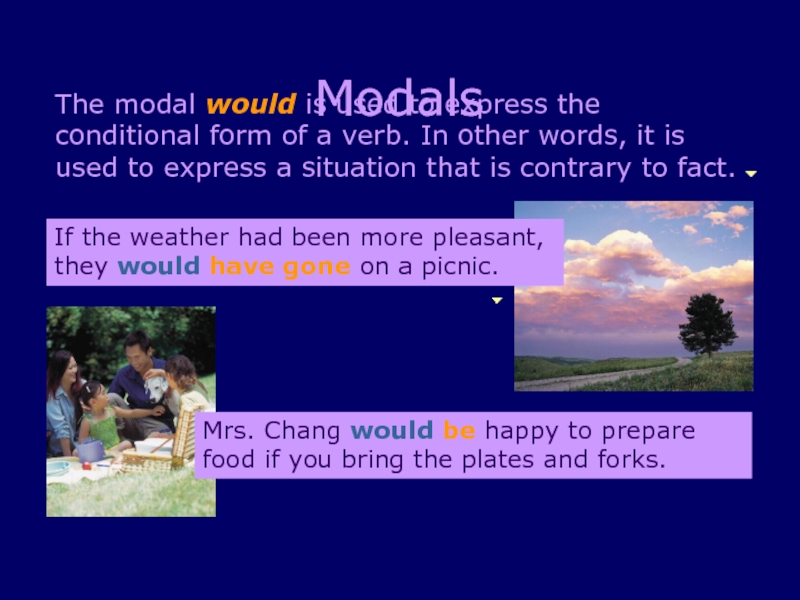
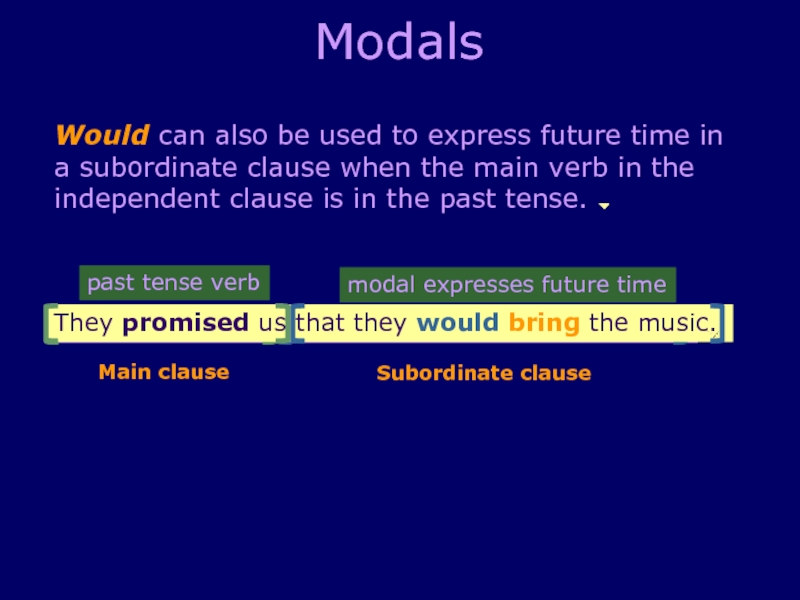
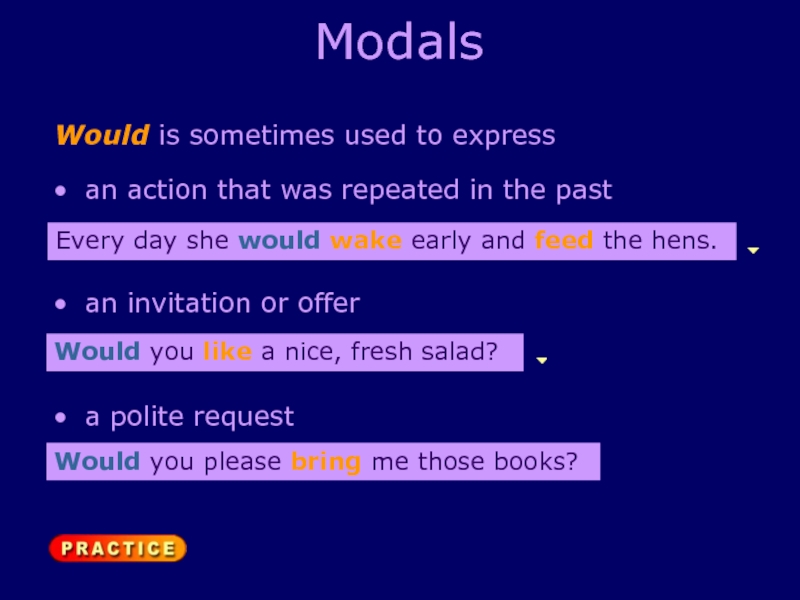
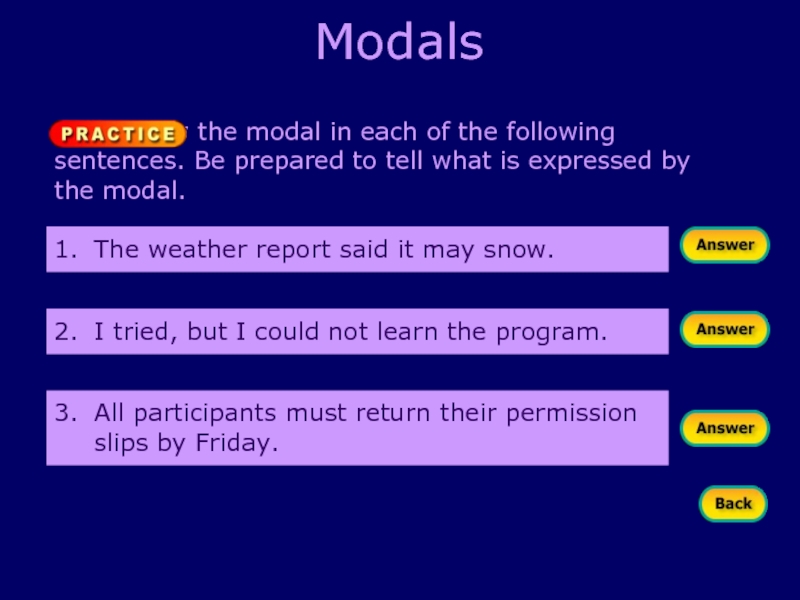
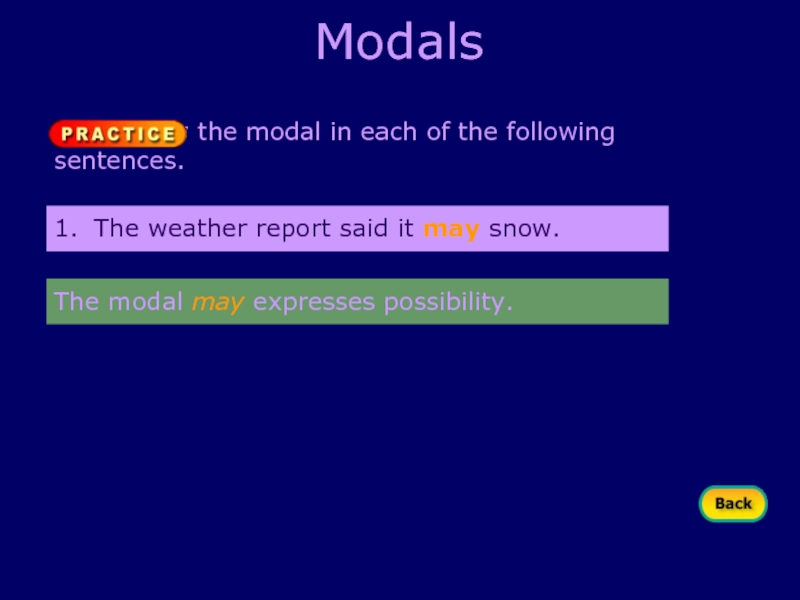
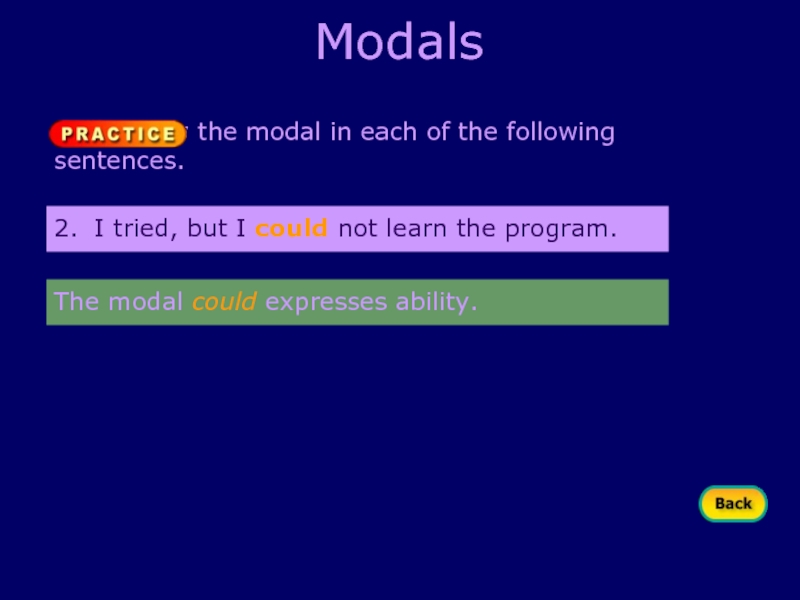
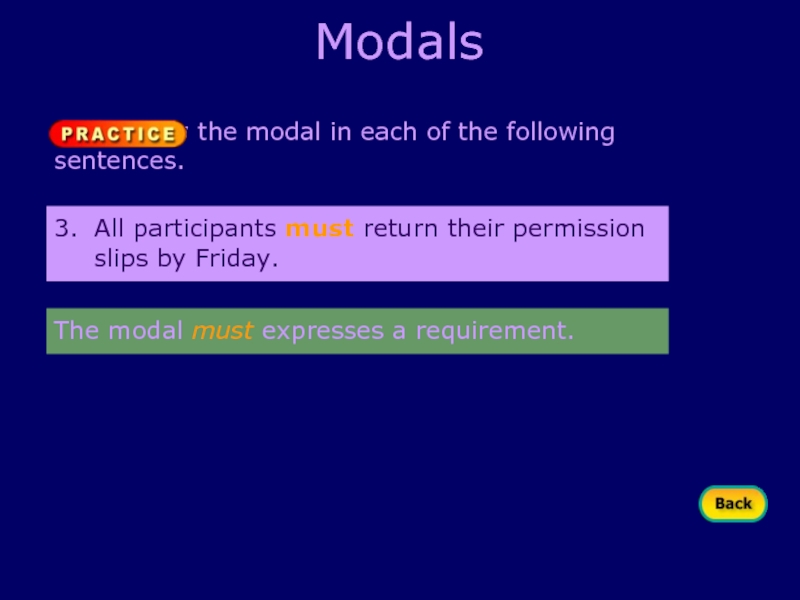
![Modals [End of Section]Supply an appropriate modal for each sentence.1. Jen _____ have cleaned out](/img/tmb/2/129855/e33ffdb8576006d92a637f68a22c35a9-800x.jpg)
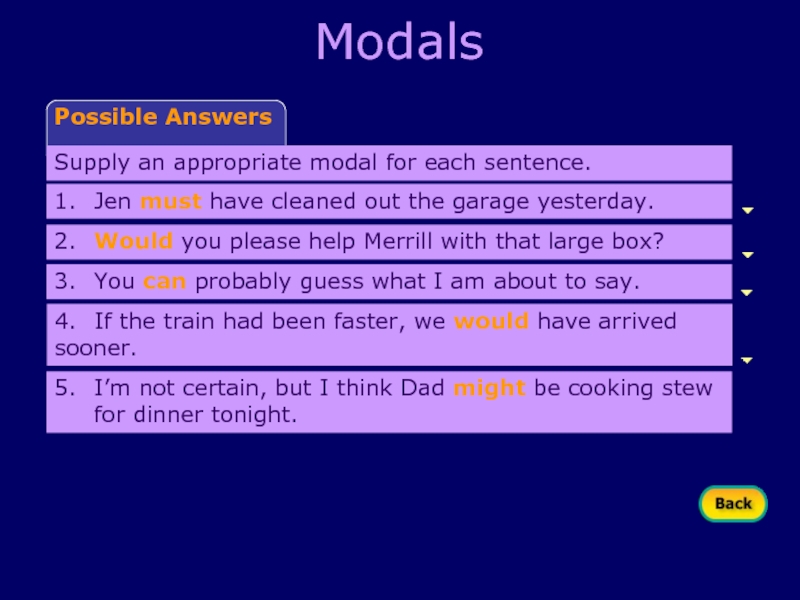
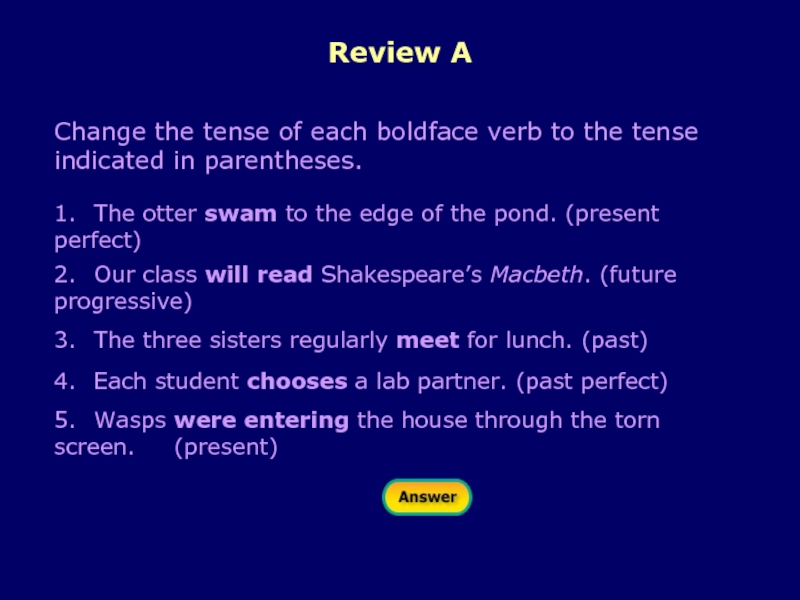
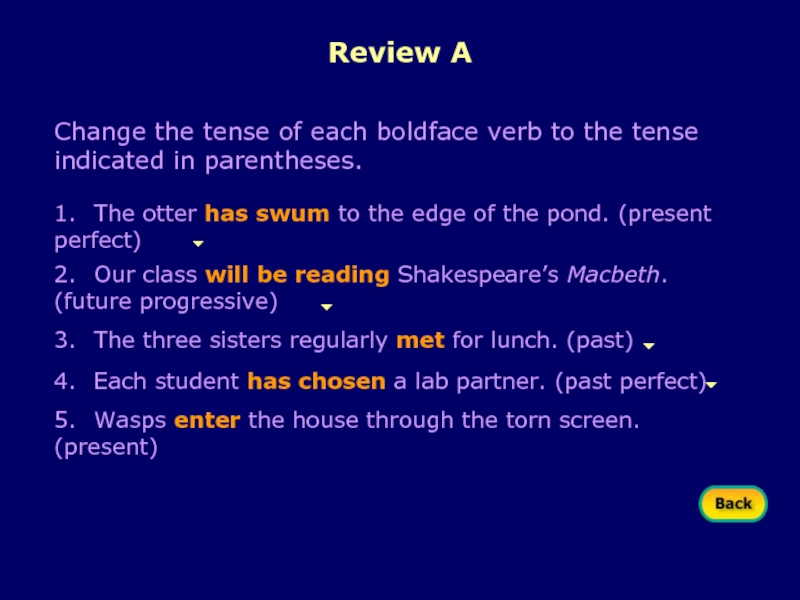
![Review B[End of Section]1. Colleen _____ almost reach the light bulb. (shows ability)2. Jack _____ repair the](/img/tmb/2/129855/78420ba7f14a317e2f148c5d8d1955f6-800x.jpg)
